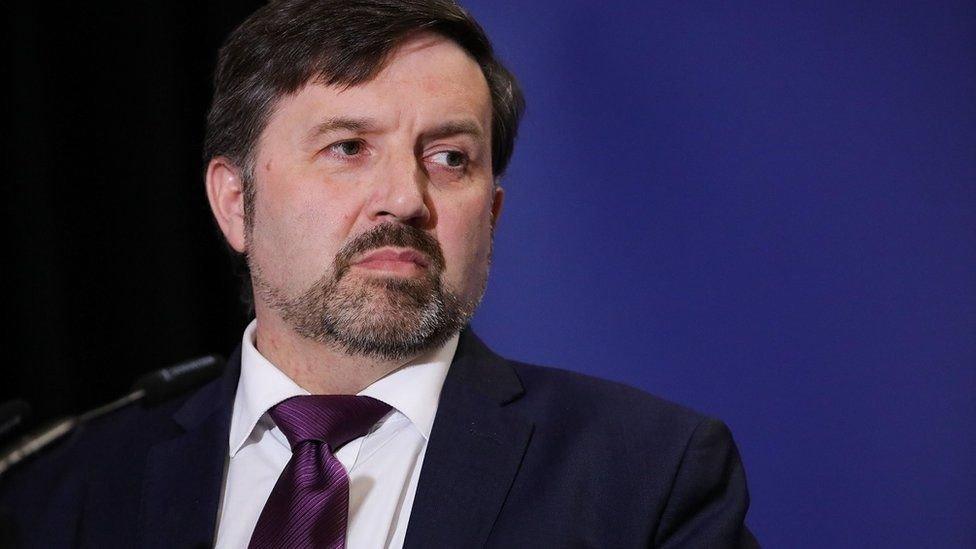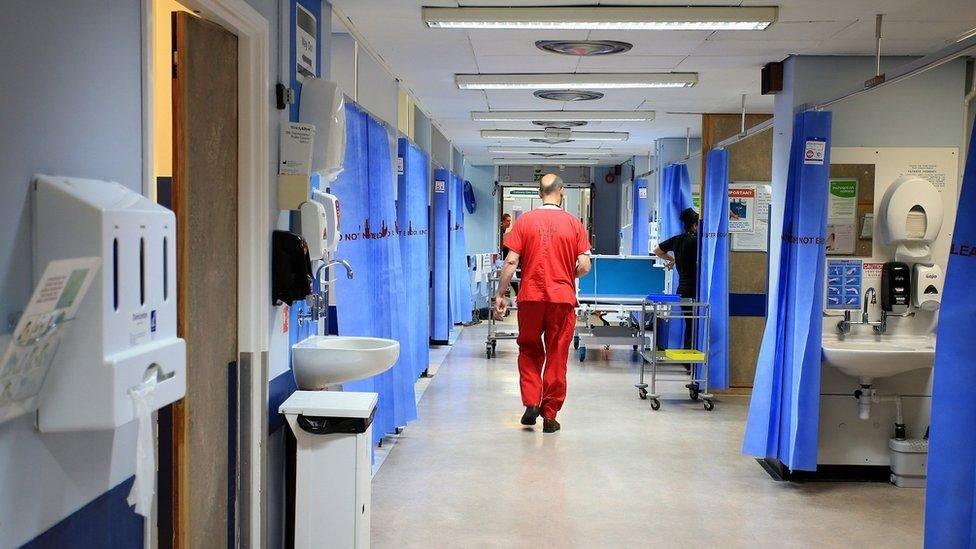Robin Swann says waiting lists plan faces some political resistance
- Published

Hospital waiting lists in Northern Ireland are the worst in the UK
Health Minister Robin Swann has said he faces challenges from some assembly colleagues over parts of his plan to cut Northern Ireland's waiting lists.
On Tuesday, Mr Swann set out a roadmap for long hospital waiting lists to be "banished" by 2026.
More than 330,000 people are on some form of hospital waiting list in Northern Ireland.
Part of the plan includes the establishment of specialist hubs and "mega clinics" for surgeries.
"In regards to the mega clinics and the hubs that we're currently setting up, those will be introduced in September, we're currently engaging with the workforces and the trusts to see where those can be best placed," Mr Swann told the BBC's Good Morning Ulster programme.
"The challenge here is for the people in Northern Ireland to be able to travel further rather than wait longer.
"My biggest challenge is neither the people of Northern Ireland supporting me in this, nor the clinicians, or the surgeons, or the nurses, or the trade unions behind me knowing that this change needs done.
"But there is a challenge from some of my political colleagues, who still fight for their own hospital, in their own corner, delivering every service - that's not possible."
The new elective care framework proposes a £700m investment over five years.
It sets out a twin-track approach of investment and reform to ensure that "backlogs do not keep re-occurring".
The framework sets a target of March 2026 for no patient waiting more than 52 weeks for a first outpatient appointment and inpatient day case treatment, or 26 weeks for a diagnostics appointment.

Robin Swann said the challenge is for people in Northern Ireland to be able to travel further rather than wait longer
But Mr Swann said that ministerial colleagues had to accept that some of their budgets may need to be cut in order to address waiting lists.
He said he was hearing acceptance of this from some, such as Infrastructure Minister Nichola Mallon, but not others.
"There's talk of special summits, there's no point in having special summits and talking about waiting lists unless parties and departments are actually coming with the financial ask that we need," he said.


At this stage we still don't know where the £700m is going to come from.
A plan or a roadmap is all very well - you still need an awful lot more to reach that final destination.
This latest roadmap needs a great deal of funding - recurrent funding - and it also needs political buy-in. It needs political stability and sadly none of those things are certain at the moment in Northern Ireland.
Robin Swann said he thinks his biggest challenge at the minute is from political colleagues, those who are sitting round the executive table, those he's meeting in the assembly. He hasn't got that political buy-in yet.
There's an awful lot that has to be done, signed and sealed in the next couple of months.

The health minister added that Northern Ireland needs multi-year budgets from Westminster in order to address long-term issues, such as waiting lists.
"We need to be able to invest in the future of our staff and also in the future of our facilities as well so that we can get on top of these waiting lists," he said.

Mr Swann said that money for waiting lists was agreed in the New Decade, New Approach deal, external to restore devolution.
He said Cabinet Office Minister Michael Gove seemed to "pick his words very carefully" when asked about the UK government's funding of the Northern Ireland health service last week.
Other aspects of the plan include:
Surgeries in ring-fenced specialist hubs
A regional NI-wide approach as opposed to a disjointed postcode lottery system
Mega clinics for outpatient, assessment and pre-operative assessment clinics
Ongoing cooperation with the independent sector
Improved data, reporting and accountability
Related topics
- Published15 June 2021

- Published19 May 2021

- Published25 May 2021
